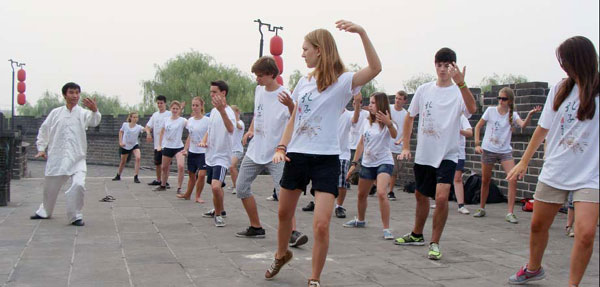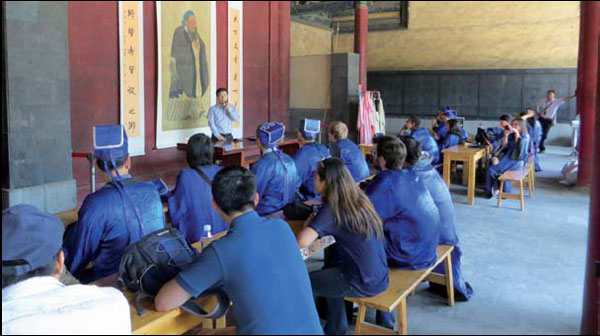Son of the city
Updated: 2013-06-14 08:00
By Ji Xiang (China Daily)
|
|||||||||||
|
College students from Austria learn tai chi on the Ming Dynasty city wall. Photos provided to China Daily |
|
Students of Stanford University study in the Temple of Confucius lecture hall. |
Qufu builds a thriving tourism trade by promoting its Confucius links
Qufu, the birthplace of one of China's most famous sons, Confucius, has through trial and error developed a thriving domestic and international tourism industry over the past 30 years.
Although his reputation in China has waxed and waned over the centuries, he remains a heavy influence on Chinese culture and one of the country's best-known historical figures, and Qufu has capitalized on this.
The bulk of international tourists visiting the city today come from other parts of Asia, where Confucianism has a strong influence, such as Japan and South Korea. But Americans and Europeans who want to understand the country's culture are also a significant number.
Over the years Qufu's Confucius- based tourism market has grown and matured and some 85 percent of foreign tourists who visit the city are thought to be travelers with an interest in the philosopher's life.
The city's cultural tourism sector began to blossom with China's reform and opening-up policy, which was enacted in 1978. It moved decisions away from central government and paved the way for the local government to build a tourism industry based on the city's most renowned figure.
Han Fengju, deputy director of Qufu Cultural Relics says: "At the time the opening-up policy was enacted there was no concept of a domestic travel market and Chinese tourist numbers in the city remained small."
It was travelers from overseas who first began to arrive in the city in search of Confucius, according to Liu Xubing, deputy minister of the Academic Exchange Department of the Chinese Confucius Research Institute, and those visits acted as a way of enhancing China's relationships with the outside world in the 1980s.
Michael Schimmelpfennig, an assistant professor of Chinese studies at Friedrich-Alexander-Universitat Erlangen-Nuernberg, led a student delegation to Qufu, which is in China's eastern Shandong province, in April, "to introduce students to China". He chose Qufu because of its connection with Confucius.
The experience of visiting China then was very different to his first visit in 1985, when it took 9 hours by train to travel from Beijing to Qufu, compared with 2 hours today, he says.
"When I first came, it was a very small city, now you have more high-grade architecture," he says.
"If you look at old travel guides, they say Qufu is famous for finding a remote and rather silent place in China. You cannot say that any more; it is rather bustling."
Schimmelpfennig is what you might call an old China hand. His interest in the country began as an archeology student and later through studying for a PhD in Chinese literature.
"My main focus was traditional Chinese literature, filial piety," he says. "By learning classical Chinese, I became interested in Confucianism. Qufu is a good spot to look at relics."
Qufu's ancient culture and openness to tourism have made it an ideal place to experience China, says Schimmelpfennig. "It is certainly very special because we are going to the birthplace of Confucius," he says.
After its first taste of international tourism, Qufu's local government lost its way in its attempts to attract more people, hosting a series of Confucius travel events during the 1990s that lacked clarity and failed in their purpose. The events were restricted to the temple, cemetery and mansion of Confucius and a feast provided at the mansion was poor. Overall, the events failed to offer anything special that could draw in greater numbers.
"Qufu didn't have the facilities to create a unique travel experience; we were not experienced and just followed the way things were done at the time," Han says.
Liu, a devoted scholar of the philosopher, has been active over the years in trying to develop Qufu's tourism potential, although not always successfully either.
"At one time we staged shows with a Confucian concept, but they were very one-dimensional and didn't resonate with the audiences."
Confucianism's huge influence across Asia makes it difficult for an individual city to establish itself as a center for tourism connected to the philosopher, Liu says.
"Confucian culture is around us every day yet it's intangible. Qufu has to be able to take advantage of the resources it has to make itself different from other places. We want to make Confucius travel a regional speciality."
Qufu also has to balance economic development with the environment, he says. A good environment with happy people will in itself be an attraction to tourists.
Schimmelpfennig also stresses the importance of Qufu creating a different experience for tourists. "In my personal opinion you are dealing with other issues aside from tourism," he says. "How do you approach guests and tell them they are not just here to see temples? They have to come here because they can use Confucianism to tell them things they don't know."
Despite setbacks, years of developing Qufu's tourism market have paid off both economically and culturally.
Economically the industry provides jobs in everything from hotels to transport.
Culturally, as China's role on the world stage grows, so does interest in Confucius and consequently Qufu's importance as a center for promoting Chinese culture.
Liu says: "The real standout feature of Confucius travel in Qufu is that tourists can leave with an understanding of Confucianism and the old ways of thinking and behaving."
Equipped with a better understanding of international tourism, Qufu's local government has improved tourism facilities and launched a series of cultural events. In 2006, the first Confucius Travel Festival took place in the city. The festival, which was the first of its kind themed on Confucius in China, has since become an annual event.
"The real strength of Qufu as a travel destination is Confucianism," Liu says. As Confucianism becomes more popular globally, so venerating him has become a national-level event."
Han says, "We also have places of natural beauty in Qufu, but Confucius is the main attraction. Other things are just an addition to this."
Travel agencies have done their part to improve the quality of services offered to tourists.
"Nowadays international visitors are very much informed, so we have turned our strategy to being more flexible," says Ma Sun, manager of the overseas tour department at Qufu China International Travel Service Co., Ltd. "We offer detailed options and foreign tourists are free to choose by themselves."
Despite the global financial crisis, overseas tourism to Qufu has remained steady, Ma says.
Improved transport facilities have also strengthened Qufu's ability to cater to foreign tourists. In 2011, high speed trains to Qufu began running from Jining Qufu Airport, which opened in late 2008, making visiting the city much easier.
Despite the improvements, development of Qufu's tourism potential remains constrained by limited finances and a lack of talented people, according to Liu.
Schimmelpfennig echoes his sentiments. "You need to have an abundance of sophisticated and highly educated scholars in traditional Chinese culture," he says. "They need to be here, they need some money to build a research facility that is thorough, and you need exchanges between international institutes."
amberjee@yahoo.com.cn
(China Daily European Weekly 06/14/2013 page24)
Today's Top News
List of approved GM food clarified
ID checks for express deliveries in Guangdong
Govt to expand elderly care
University asks freshmen to sign suicide disclaimer
Tibet gears up for new climbing season
Media asked to promote Sino-Indian ties
Shots fired at Washington Navy Yard
Minimum growth rate set at 7%
Hot Topics
Lunar probe , China growth forecasts, Emission rules get tougher, China seen through 'colored lens', International board,
Editor's Picks

|

|

|

|

|

|







